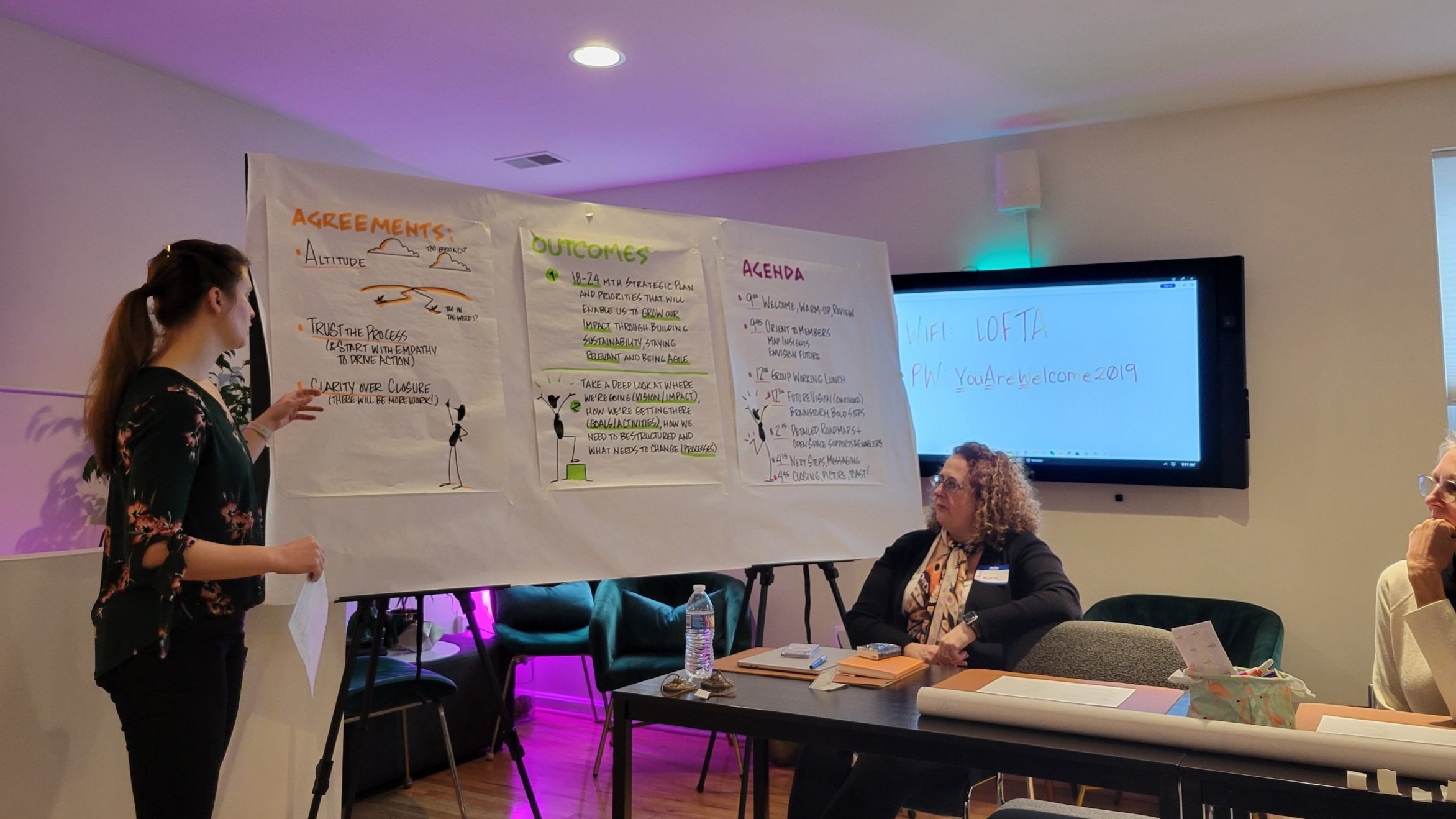How Visual Tools Helped Create a New Vision and Roadmap
It’s normal for teams and organizations to get busy with their day-to-day work and not create time to step back, take stock of what they’ve learned and think ahead to what’s next.
In Chris McGoff’s book The Primes, he talks about how taking time to work “on” the business—rather than always being “in” the business—helps teams and organizations re-align, enabling higher-functioning and more productive teams.
What Made this Meeting Work
Strategic planning meetings require techniques that ensure all voices can be heard and all ideas can be mapped so that the right decisions can be made using these ideas.
During a meeting in January 2023 with the Mid-Atlantic Facilitator Network (MAFN)—a community of practice for new and experienced facilitators—we made this possible by…
Priming the participants using team-building energizers.
Using Open Space techniques that allowed participants to set the focus on what they felt was relevant and important.
Breaking down the process by having participants brainstorm an ideal future individually, consolidate their ideas in small groups, and turn the most common themes amongst the whole group into key phrases.
And engaging the services of a graphic recorder to help us build a high-level vision map.
Following the event, MAFN’s planning committee used the resulting roadmaps and suggested next steps to form working groups to continue the action forward.
Setting the Scene
The team at MAFN had not refreshed their vision or strategic plan for several years, and it was time to assemble their board of directors and collaborate with a committee on their plan for the next year. After conducting two listening sessions and a survey from around 100 members, the thing on everyone’s mind was making sure that the members of MAFN and their needs were at the heart of the organization’s focus and activities.
Our Process
The overall flow of the meeting moved from understanding the present situation to envisioning the future and designing action steps—a typical “Future Search” flow.
After a brief team-building energizer, we kicked off with a discussion about MAFN members using an empathy map. An empathy map is a worksheet designed to help teams capture the challenges and needs of their target audience or stakeholders (top left photo). This helped to anchor the following conversation around the needs of members and reduce conflict by encouraging everyone to align with a common purpose.
This led into a breakout activity envisioning MAFN as if it were on the cover of a magazine in 2025. Using unique visual templates, such as a magazine cover (top right photo), makes the act of visioning more accessible through use of metaphor and allows for creative thinking outside the bounds of standard goal setting activities.
After bringing the group back together, we abstracted themes from across the cover visions to create a shared vision using a bold steps canvas drawn by graphic recorder Austin Raymond (bottom left photo).
After consolidating the vision “above the horizon,” we brainstormed the “bold steps,” or phases of action, that would enable MAFN to reach its vision. For this project, that meant a focus on:
Structure and governance
Programming
Member engagement
Membership growth through recruitment and retention activities
With the bold strategies in place, we finished the day by creating lower-level action plans to break down each bold step into smaller, more actionable tasks (bottom right photo).
What to Take Away
Success for MAFN was achieved through member-focus, creative visioning, visual facilitation and a commitment to actionable implementation, ensuring alignment with members' needs and a clear path toward the organization's future vision.
During this workshop, we used templates from Grove Tools, a leader in strategic visioning. You can purchase templates and leader guides on the Grove’s website.
If you want to learn more about strategic visioning and get trained in these methods, check out our in-house workshop on strategic visioning and change or reach out to discuss bringing us in to facilitate a visioning session with your team.
This article contains affiliate and/or compensated links. For more information, visit our Terms and Conditions.





